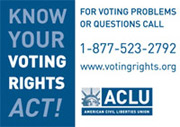(Originally posted on Daily Kos.)
It seems each day brings a new story about allegations of fraud during ACORN's voter registration drives. But what is often left out is that there is absolutely no credible evidence that phony registrations translate into fraudulent votes. Mickey Mouse or Donald Duck might be registered, but neither is likely to show up to vote on Election Day. But while voter registration fraud does not threaten the integrity of this election, there is a very real concern that widespread voter suppression does.

This is not new. We have a long history in this country of officials systematically denying people the right to vote. In the past we had literacy tests, poll taxes, residency requirements, all-white primaries, intimidation, and challenges to voter eligibility, all designed to keep African-Americans from voting. More recently, we have seen the widespread use of vote caging — sending "Do Not Forward" letters to minority voters that, if returned, could be used to challenge them as nonresidents.
Today, we are seeing a rash of new schemes to deny people the right to vote, often in the form of voter purges. These efforts are often driven by partisanship and are in response to unprecedented increases in the registration of voters believed likely to vote for the other party. They continue to target minority voters, as well as students who tend to vote differently than the general population.
This month, the Montana Republican Party challenged the residency of 6,000 registered young and likely Democratic voters in several counties in Montana. The party compared the voter rolls with the U.S. Postal Service's change of address registry, and compiled a list of voters who might have changed their mailing address without changing their voter registration. State law provides, however, that people who change residence within a county are still entitled to vote. The election administrator of Missoula County said only twice in the past 15 years had anyone tried to challenge another voter's eligibility. In a lawsuit that was subsequently filed, a federal judge stated that "the timing of the challenges is so transparent it defies common sense to believe the purpose is anything but political chicanery."
Similar patterns have emerged in other states, as well. In Michigan, state officials purged 1,438 people whose voter identification cards were returned as undeliverable by the post office. In ordering the voters returned to the rolls, a federal court ruled that the purges violated the National Voter Registration Act, which prohibits the automatic purging of a voter merely because a registration card is returned as undeliverable. The proper procedure is to give notice to voters and remove them from the rolls only if they fail to vote in the next two elections.
Partisans in Ohio tried to intimidate voters by challenging the legality of a weeklong period in which new voters could register and cast an absentee ballot on the same day. And despite the fact that the U.S. Supreme Court rejected an attempt by Ohio Republicans to challenge 200,000 newly registered voters, the White House took the extraordinary step of asking the Attorney General to launch an investigation.
In Georgia, the Secretary of State advised county registrars to challenge registered voters and applicants for registration who had indicated they were not citizens on an earlier application for a driver's license. Several public interest groups filed a lawsuit charging that the state had never received preclearance of its new voting procedure as required by the Voting Rights Act and that it was in violation of the National Voter Registration Act, which does not allow systematic purges of voters 90 days prior to an election. A three-judge federal court ruled last week that the state had not complied with the Voting Rights Act and ordered it to preclear the new purge system. As the election gets closer, similar incidents are piling up in state after state.
The right to vote is a precious tenet of our democracy. The Supreme Court has called it "preservative of all rights." It is protected by state law, the U.S. Constitution, and numerous federal statutes. Yet, sadly, many partisan officials in our country seem determined to do whatever it takes to deny certain voters the right to cast their ballots. These efforts might march under the banner of good government and the prevention of voter fraud, but don't believe it. The real goal is voter suppression.
The ACLU has been on the ground fighting voter suppression across the nation, in the courts and on the streets, as have other groups. Voters must also join the fight, and do their best to protect their own voting rights by planning ahead, voting early and checking their voter registration status as soon as possible. There is too much at stake this November 4 for citizens to be denied their voices in choosing America's next leader.



